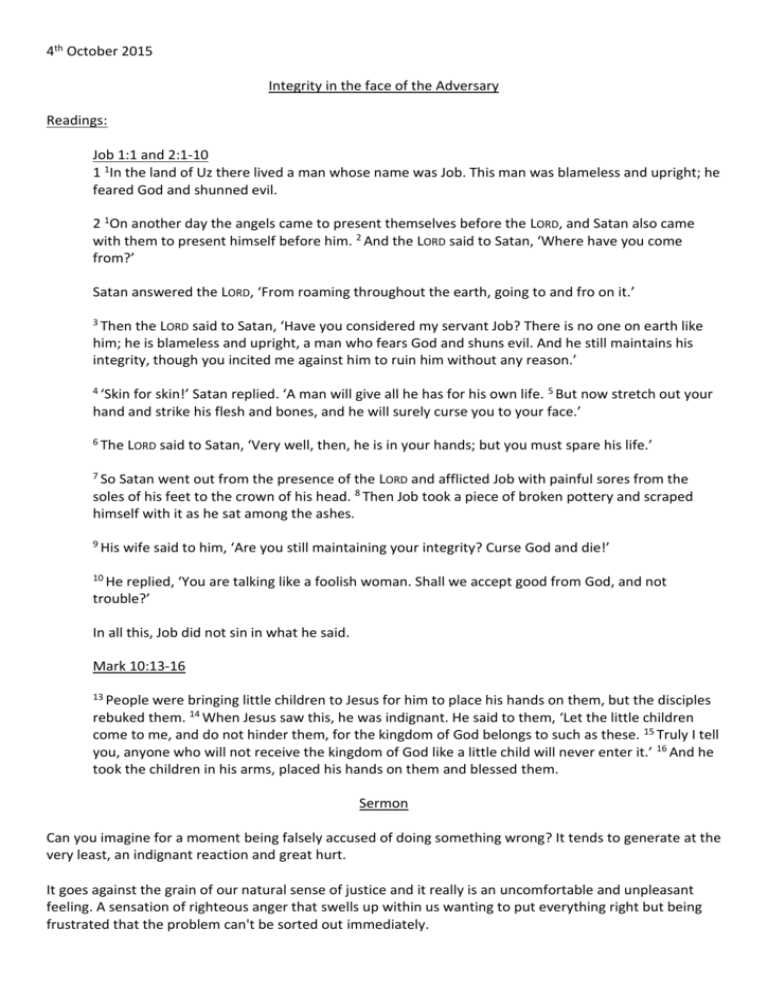or a microsoft Word version click here
advertisement

4th October 2015 Integrity in the face of the Adversary Readings: Job 1:1 and 2:1-10 1 1In the land of Uz there lived a man whose name was Job. This man was blameless and upright; he feared God and shunned evil. 2 1On another day the angels came to present themselves before the LORD, and Satan also came with them to present himself before him. 2 And the LORD said to Satan, ‘Where have you come from?’ Satan answered the LORD, ‘From roaming throughout the earth, going to and fro on it.’ 3 Then the LORD said to Satan, ‘Have you considered my servant Job? There is no one on earth like him; he is blameless and upright, a man who fears God and shuns evil. And he still maintains his integrity, though you incited me against him to ruin him without any reason.’ 4 ‘Skin for skin!’ Satan replied. ‘A man will give all he has for his own life. 5 But now stretch out your hand and strike his flesh and bones, and he will surely curse you to your face.’ 6 The LORD said to Satan, ‘Very well, then, he is in your hands; but you must spare his life.’ 7 So Satan went out from the presence of the LORD and afflicted Job with painful sores from the soles of his feet to the crown of his head. 8 Then Job took a piece of broken pottery and scraped himself with it as he sat among the ashes. 9 His wife said to him, ‘Are you still maintaining your integrity? Curse God and die!’ 10 He replied, ‘You are talking like a foolish woman. Shall we accept good from God, and not trouble?’ In all this, Job did not sin in what he said. Mark 10:13-16 13 People were bringing little children to Jesus for him to place his hands on them, but the disciples rebuked them. 14 When Jesus saw this, he was indignant. He said to them, ‘Let the little children come to me, and do not hinder them, for the kingdom of God belongs to such as these. 15 Truly I tell you, anyone who will not receive the kingdom of God like a little child will never enter it.’ 16 And he took the children in his arms, placed his hands on them and blessed them. Sermon Can you imagine for a moment being falsely accused of doing something wrong? It tends to generate at the very least, an indignant reaction and great hurt. It goes against the grain of our natural sense of justice and it really is an uncomfortable and unpleasant feeling. A sensation of righteous anger that swells up within us wanting to put everything right but being frustrated that the problem can't be sorted out immediately. maybe for for many of us, in the grand scheme of things, those incidents might on reflection seem trivial now but sometimes it can be life changing. A year or so ago, there was a dramatisation on television titled “ The Lost Honour of Christopher Jefferies.” Maybe some of you might remember it. Christopher Jefferies was a retired public schoolteacher living in Bristol. He lead a quiet and ordinary life enjoying his retirement. He also happened to derive an income from letting out apartments in his house. One terrible winter’s night,one of his tenants, a young woman called Joanna Yeates, went missing and her body was discovered several days later lying on the roadside covered by the snow. Christopher Jefferies became the prime suspect and was hounded terribly by the media. The press were particularly taken by his odd hairstyle and peculiar manner. If there ever was a trial by media then this was it. His life was opened up by the police and press and it seemed that no one would believe his innocence. He was ostracised within his community with many feeling that it was a case of “no smoke without fire” and that he was guilty of something to do with that awful murder. Happily the police dropped their investigation of him and convicted the real murderer but Christopher Jeffrey’s life was never going to be the same again. Terrible things can happen to innocent people and I suppose in the Old Testament there is none more innocent than Job. Job we are told was a man both blameless and upright. He was the greatest man among all the people of the East.He ticked all the boxes for wisdom in so far as he feared God and shunned evil and to fear the Lord is to know the Lord in wisdom’s understanding. He also was a man of vast wealth and had a large family. His was a story of great success. In his contemporary’s eyes, Job was indeed blessed and favoured by God. And then suddenly for no reason Job’s world was to come crashing down around him. Four disasters strike his property and his family.two of them from the work of the Chaldeans and the Sabeans and two in the form of fire from heaven followed later by a tornado killing all seven of his children. He has lost everything. Job collapses on hearing all this but gets up, tearing his robes and shaving his head in grief and mourning and utters these famous words: Naked I came from my mother’s womb and naked I shall depart. The Lord gave and the Lord has taken away; may the Lord’s name be praised. (Job 1:21) So with this background of tragedy Job is further afflicted by a terrible skin disease and is thrown out of is community and he is left to languish in the ashes and the waste tip on the edge of his town. “How can Job be innocent when this has happened to him?” the townsfolk would ask. “He must have done something terrible to incur God’s displeasure” - clearly no smoke without fire in their eyes. Even Mrs Job doubts him and her poisoned advice of cursing God and do doing everybody a favour by dying makes you wonder what kind of woman she was. Can we imagine how Job must feel now with all this tragedy? And yet there's that finger of suspicion pointing at him of somehow he deserved it because he must have done wrong. Yet Job’s dignified reply again mirrors that at the end of the first chapter and he scolds her for “ talking like a foolish woman” and then asks ”Shall we accept good from God and not trouble” Shall we accept good from God and not trouble is a question that the whole book of Job looks to help us understand, but these eleven verses-from the opening two chapters that we have listened to today put the story of Job in a universal context. What they point to are the two kingdoms of heaven and earth and a heaven where God rules in his majesty. But in this heavenly court is a dissenting voice which belongs to Satan. It seems that many biblical commentators are a little wary of identifying this satan of the Old Testament with the one we see in the New Testament and suggest that the the Hebrew word “saw- tawn”, which sounds like satan, really means The Adversary. The definition of an adversary is a person who is hostile to someone. Well this adversary seems hostile to both God and man. But in Job we get an insight into how the mentality of this hidden adversary works. There is a cynicism that comes through. “Skin for skin. A man will give all that he has for his own life.” There is something so unpleasant about that phrase. But it's so effective. It’s an unpleasantness that infects the attitude of Job’s neighbours who are so keen to believe that he has done something wrong and, worst of all, this malignancy attacks the spirit of his wife, encouraging Job to curse God and die. This is one of the Satan’s goals of trying to get Job to curse God. But for us as Christians it is perhaps better to be viewed from our New Testament perspective of being tempted to break the promise to love God with all our hearts, our minds and our souls as Jesus commanded. We also get an idea of what the Adversary gets up to. God’s question of “Where have you come from?” might be better understood in the modern day vernacular of “What have you been up to?” The Adversary’s response is suitably glib and evasive: “From roaming through the earth and going to and fro in it.” Throughout all the gospels, Jesus is continuously questioned and tested by the Pharisees looking to catch him out, looking to turn people's opinion against him. But standing right behind those Pharisees and egging them on is the adversary getting them to do his job, looking to turn people away from the gospel. But even worse, in the reading from Mark, the Adversary gets into the minds of the disciples, who were rebuking those parents bringing their children to Christ It is so easy to see the work of the Adversary in this present day - the cynicism and negativity that seem to question all that is good. Resentment and disunity that can cause so much pain within church communities are an ever-present danger and exist world-wide. The roaming of the Adversary spreading its discontent and discord is highly effective and difficult to resist. Peter in his New Testament letter is acutely aware of the roaming to and fro of the Adversary and the need to resist. He warns us “Be self-controlled and alert. Your enemy the devil prowls around like a roaring lion looking for someone to devour.” Yet somehow Job managed. The Adversary was principally after one thing that was so important to Job, the one thing that Job held on to dearly throughout his ordeal, and that was Job’s integrity. Integrity is a word that is bandied about quite freely particularly in the political sphere and perhaps it doesn't have the significance that it should nowadays. It is defined as an adherence to moral principles and honesty. It also describes the quality of being unimpaired, soundness, wholeness. I came across a visual metaphor for integrity. It was a picture of a single mast yacht and this mast was there to represent a person’s integrity. The idea is that it is central to a person’s being holding everything together. In order for the yacht to function properly, the mast had to be in place. Job sets us an example of maintaining his integrity in the most extreme of circumstances. However what holds his integrity together is Job’s faith in God. It is his faith that keeps him blameless and upright; it is his faith that makes him fear (or know) the Lord and shun evil; it is Job’s faith that allows God to say, “Have you considered my servant Job who still maintains his integrity?” Our integrity is maintained in Christ. In Mark’s gospel, Jesus warns us by saying that “Anyone who does not receive the Kingdom of God like a little child will never enter it.” That is to say, it is in the sense of complete trust and perhaps a letting go that will allow us to fear the Lord as we should. The book of Job is a long read. Much of the dialogue is in the form of poetry and is similar to the Psalms. Job does not take his suffering lying down and questions why it is happening to him. Many of these are in the style of the Psalms and it shows that we can be angry in our prayer. We can rail against injustices. We can pray for wrongs to be made right. We can pray in confidence and trust because, although Job is tested to the limit, God’s protection is upon him. In Christ, we are members of God’s Kingdom and his eternal love is upon us. Jesus did not promise that being his disciple would be easy, and many have perished and suffered in Christ’s name, but Job turns our eyes to the promise. “ I know that my redeemer lives and in the end will stand upon the earth. And after my skin has been destroyed, yet in my flesh I will see God; I myself will see him with my own eyes- and not another. How my heart yearns within me.” Amen AC










